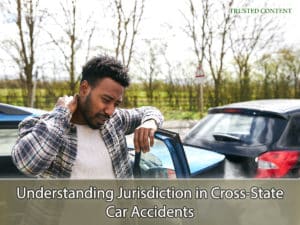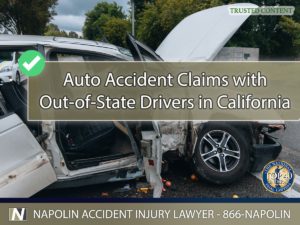Managing Auto Accident Claims with Out-of-State Drivers in California
Navigating the aftermath of a car accident can be particularly challenging when it involves an out-of-state driver. This scenario introduces additional layers of complexity due to differing state laws, insurance policies, and jurisdictional issues. Understanding your legal rights and the steps you need to take is crucial for anyone involved in such an incident in California. This article aims to demystify the process, offering detailed guidance on handling auto accident claims involving drivers from outside California. By providing clarity on jurisdiction, insurance nuances, and negligence laws, we aim to empower accident victims to take informed actions towards securing their rightful compensation.

Understanding Jurisdiction in Cross-State Car Accidents
Understanding Jurisdiction in Cross-State Car Accidents
Jurisdiction is a fundamental concept in legal disputes involving car accidents, especially when an out-of-state driver is involved. It determines the state in which a lawsuit can be filed and adjudicated. Typically, for accidents occurring in California, the state's courts will have jurisdiction, allowing residents to file lawsuits within the state. This legal provision is particularly advantageous for local residents, facilitating access to the courts and simplifying the legal process. Choosing the right jurisdiction is critical, as filing in an incorrect venue can result in the dismissal of the case. Legal counsel can provide invaluable assistance in making this determination, ensuring that your case is heard in the appropriate court.
California's Approach to Out-of-State Driver Accidents
When an auto accident in California involves an out-of-state driver, California law usually governs the proceedings. This jurisdictional rule ensures that the laws of the state where the accident occurred apply, regardless of the drivers' home states. California employs a comparative negligence system, which allows for financial recovery even if the plaintiff is partially at fault, albeit with a reduction in compensation proportional to their degree of fault. This contrasts with states that operate under contributory negligence laws, where any fault attributed to the plaintiff can bar recovery. Understanding these nuances is vital for effectively navigating your claim, as the specific facts of your case will determine the applicability of these laws and the potential for compensation.

Navigating Insurance Complications with Out-of-State Parties
Navigating Insurance Complications with Out-of-State Parties
One of the most perplexing aspects of accidents involving out-of-state drivers is dealing with varying insurance requirements. Each state has its own minimum insurance coverage standards, which can lead to discrepancies in coverage levels. California residents may find that an at-fault out-of-state driver's insurance does not meet California's minimum coverage requirements. In such cases, understanding the provisions of your own insurance policy, particularly regarding uninsured and underinsured motorist coverage, becomes crucial. This coverage can provide a safety net, allowing you to claim against your own policy when the at-fault driver's insurance is insufficient. However, navigating these claims requires a thorough understanding of both your policy and California insurance laws.
Legal Strategies for Dealing with Uninsured Out-of-State Drivers
Encountering an uninsured out-of-state driver complicates the pursuit of compensation. However, legal avenues remain open. You can initiate a lawsuit against the uninsured driver, a process that, while potentially challenging, is not without merit. Success in such cases depends heavily on the ability to prove negligence on the part of the out-of-state driver and to navigate the complexities of enforcing a judgment against a party residing outside of California. The assistance of an experienced legal professional is invaluable in these instances, offering strategic advice and representation that can significantly increase the likelihood of a positive outcome.
Expert Legal Support: Your Key to Navigating Complex Claims
The assistance of a skilled personal injury lawyer becomes indispensable in auto accident claims involving out-of-state drivers. A lawyer well-versed in California's jurisdictional rules, insurance regulations, and negligence laws can offer crucial guidance and representation. From evaluating the merits of your case to navigating the legal proceedings, their expertise can simplify the complex legal landscape you face. Moreover, a lawyer can negotiate with insurance companies on your behalf, work to secure a settlement that reflects the true value of your claim, and represent you in court if necessary. With the right legal support, you can focus on your recovery while your legal team focuses on securing the compensation you deserve.

Managing Auto Accident Claims with Out-of-State Drivers in California
Managing Auto Accident Claims with Out-of-State Drivers in California
Auto accidents involving out-of-state drivers present unique challenges that require careful navigation. Understanding the jurisdictional rules, insurance complexities, and applicable laws is crucial for anyone seeking to pursue a claim under these circumstances. With the guidance provided in this article and the support of experienced legal professionals, you can take informed steps towards protecting your rights and securing fair compensation. If you're facing the aftermath of an accident with an out-of-state driver, reaching out for legal assistance is a critical first step. At Napolin Accident Injury Lawyer, we are committed to providing the support and representation you need. Contact us at (866)-NAPOLIN for a free consultation, and let our extensive experience in auto accident claims work for you.
- Safely and Legally Navigating Parking Lots in California - July 15, 2024
- Navigating the Aftermath of a Highway Auto Accident in California - July 15, 2024
- An Overview of California's Commercial Truck Insurance Laws - July 15, 2024
